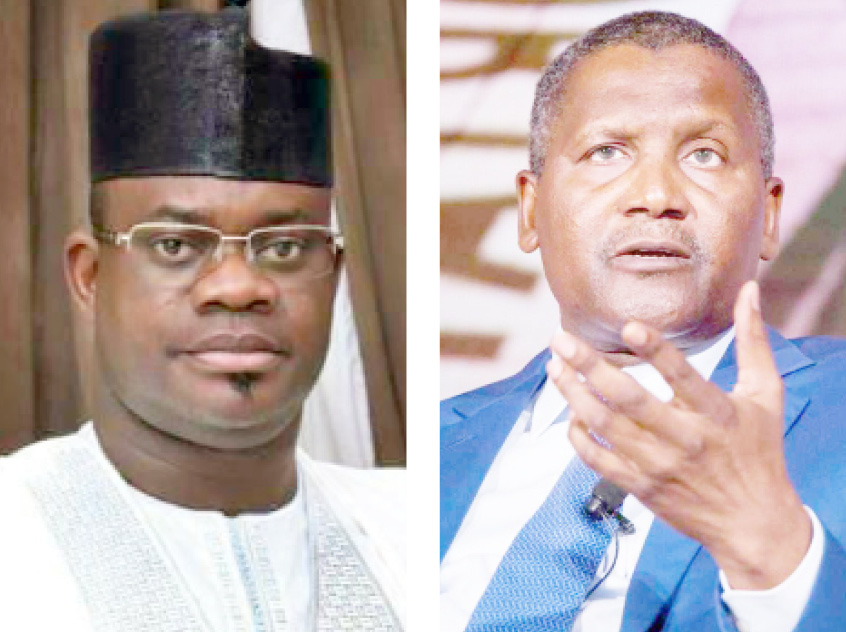Over the past two weeks, a very public fisticuff of sorts has ensued between the Kogi State Government (KSG) and Dangote Cement Plc (DCP) over claims of “tax evasion” and “unresolved ownership” of Obajana cement plant by the former, which the latter refutes.
Apparently, the dispute between the two has been long-running under the surface, but matters took a violent turn when on Wednesday 5, October, a group of vigilantes reportedly stormed the premises of the plant, forcefully sealed it off, and allegedly injured an unspecified number of workers in the process.
FG inaugurates Ekiti airport as first airplane lands
How flood, boat accident killed dozens in Anambra
Daily Trust condemns the resort to violence and forceful shutdown of the plant as a means of resolving this dispute, whether or not it occurred on the orders of the Kogi State Governor as widely perceived. Violence is not, and cannot be the answer to resolving a dispute over an entity of value to both parties, if in different ways. We also frown at any outcome that will lead to loss of jobs of the thousands of Nigerians who work at the plant, especially at a time the economy is only stuttering to recovery from the ravages of the pandemic and spill-over effects of a global economic crisis.
Both sides appear to agree that the old cement company, established 30 years ago in 1992, was solely owned by the Kogi State Government. Both sides also appear to agree that 10 years after its establishment, in 2002, the KSG invited the Dangote Group/Dangote Industries Limited to invest in the company. It is also clear that minerals rights, anywhere in Nigeria, belong to the federal government. Beyond this, however, the matter is hazy: thin on facts, thick on hubris on both sides. But the questions in dispute are clearly over the terms and conditions of the 2002 agreement at which the ownership rights of the old company changed hands between the two parties.
In a press statement on October 11, Dangote Industries Limited (DIL), which owns the Dangote Cement Plc, the new name of the company that came into force in 2010, claims that the 2002 agreement between it and the KSG stipulated that “DIL would establish a cement plant with a capacity of 3,500,000 metric tonnes per annum. That DIL shall hold 100 per cent of the shareholding in OCP, and source for all the funds required to develop the cement plant. KSG shall have the option to acquire five per cent equity shareholding in OCP within five years; and KSG shall grant tax relief and exemption from levies and other charges by KSG for a period of seven years from the date of commencement of production”.
The statement further accused the Kogi State Government of breaching all of these provisions in the agreement between the two parties, and insisted that the Obajana Cement Company, now Dangote Cement Plc “has paid all due sub-sovereign taxes, levies and charges to KSG since it commenced production in 2007”.
The Kogi State Government refuted this claim in a press statement of its own the following day, describing the whole 2002 agreement as an exercise in “callous and deliberate asset grabbing”, and challenged the DIL to provide proof of ownership. The statement reiterated that the state government “held 100 per cent of its shareholding in trust for its people, long before DIL ventured into the state and longer still before Dangote Cement Plc came into existence”.
The statement further claimed that the KSG had taken a loan of “at least 15million Deutsche Marks” to conduct feasibility assessments and commercial viability of “vast limestone deposits” at the site of the plant. “Sadly, for over a decade after DIL and DCP started posting profits from the operations of the Obajana plant, the Kogi State Government was still labouring to pay off the said loan and interests accruing thereon”.
Daily Trust believes that unless both sides are being economical with the truth, this is rather a simple matter. Lengthy advertorials in newspapers are not evidence of payment of taxes or the legal proof of ownership of a company, nor are reports of a contorted Judicial Commission of Inquiry or the resolutions of the Kogi State House of Assembly on a matter in which the government of the state is a party. Dangote Industries Limited cannot prove ownership of Obajana plant of Dangote Cement Plc merely by publishing advertorials in newspapers. And the Kogi State Government or Kogi State House of Assembly cannot be a judge in its own case.
We commend the federal for intervening promptly in the dispute and helping to avert further escalation. It is also commendable that the Buhari government has reportedly secured a new agreement between the two parties and ‘ordered’ the Kogi State government to reopen the plant in the interest of workers and the overall national economy.
We are not convinced, however, that a temporary cease-fire brokered in secret by a government that has only months to complete its term will necessarily secure enduring peace on this matter. The case is about the rights of ownership of a legal entity. One party in this dispute is a business, and the other are the government and people of Kogi State, including generations of them yet unborn. President Buhari cannot on his own will an enduring agreement into existence on such a matter.
In the interest of a permanent resolution, we urge both parties to go to court, or failing that, to submit to an independent arbitration process the outcome of which must be made public.

 Join Daily Trust WhatsApp Community For Quick Access To News and Happenings Around You.
Join Daily Trust WhatsApp Community For Quick Access To News and Happenings Around You.


